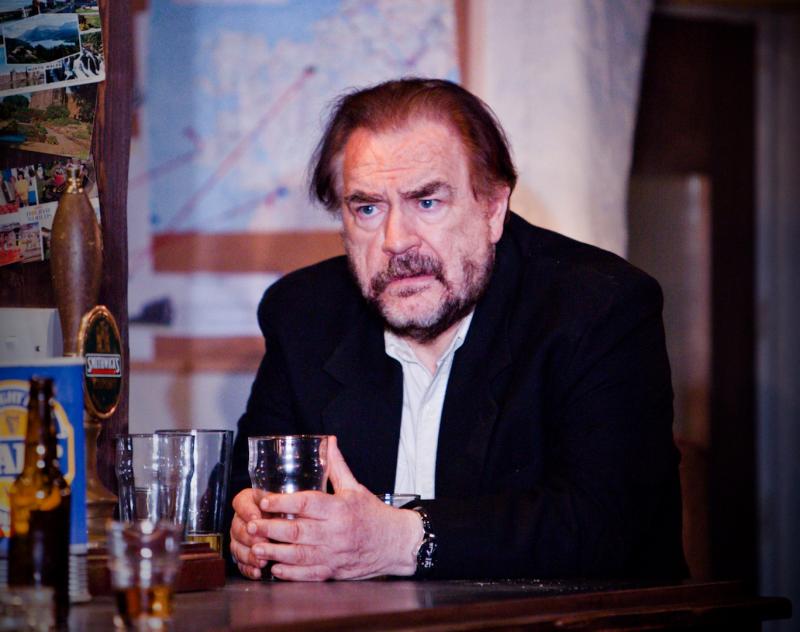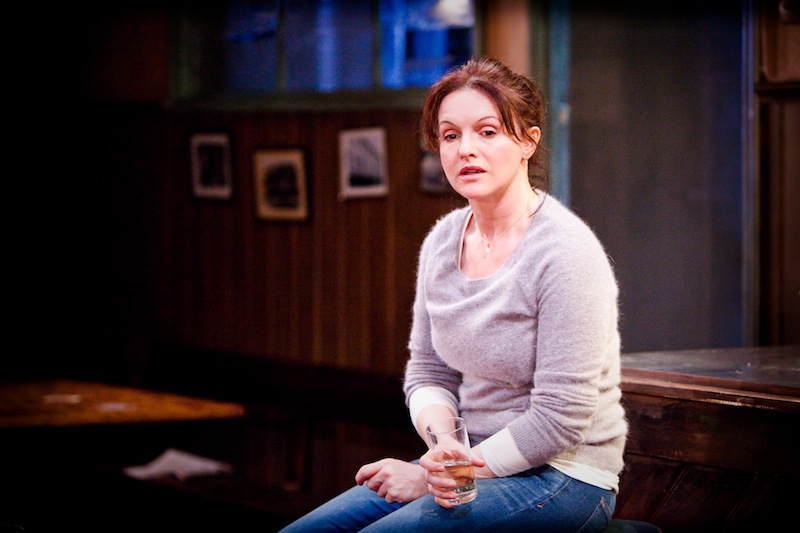The Weir, Donmar Warehouse | reviews, news & interviews
The Weir, Donmar Warehouse
The Weir, Donmar Warehouse
Mesmerising revival of Conor McPherson's haunting play

Conor McPherson’s 1997 play has become a modern classic, and it's not difficult to see why. It's a glorious evening of storytelling that allows the cast to display their wares, as the conversation between characters who have known each other all their lives flows and ebbs as they reminisce, josh and cajole each other with both affection and darker, underlying feelings.
We are in rural County Leitrim in Brendan's pub (expertly realised in Tom Scutt's design), which is empty save for a couple of regulars, single men of the village. Brendan (Peter McDonald) dispenses drinks as local garage owner Jack (the towering Brian Cox) dispenses wisdom, based mostly on his own limited experience of the opposite sex. Bombastic, but not yet totally cynical, he advises the much younger Brendan, henpecked by his sisters who have an interest in the family farm, to get himself a wife and not turn into a grumpy old sod like him. Then handyman Jim (Ardal O'Hanlon), who lives with his mother “who has been fading for years”, joins them for a short one (which means several) and local bigshot Finbar becomes the topic of conversation.
 The men are aggrieved that Finbar (Risteárd Cooper), a married man, has been seen showing a woman around the locality. We know Finbar is a wide boy as he enters, dressed in a pale linen suit, and we learn that the woman is Valerie, a “blow-in from Dublin”, an academic who has just bought a house from Finbar once lived in by an old woman of the village. Soon the conversation turns to the old days, of roads the fairies travelled along, of graveyards and the departed. As the men tell their tales, what starts as a laugh quickly reveals each man's vulnerability, and we see them, all unused to female company, compete for Valerie's approval.
The men are aggrieved that Finbar (Risteárd Cooper), a married man, has been seen showing a woman around the locality. We know Finbar is a wide boy as he enters, dressed in a pale linen suit, and we learn that the woman is Valerie, a “blow-in from Dublin”, an academic who has just bought a house from Finbar once lived in by an old woman of the village. Soon the conversation turns to the old days, of roads the fairies travelled along, of graveyards and the departed. As the men tell their tales, what starts as a laugh quickly reveals each man's vulnerability, and we see them, all unused to female company, compete for Valerie's approval.
There is much, as the Irish say, codding on and the language is wonderfully expressive - “That's the way cunts always go about their business,” says Brendan of Finbar. Entirely believable, too, is the eagerness of the men to tell ghost stories to the stranger, partly to test her mettle, partly for their own enjoyment. My parents and grandparents (from a place in Ireland that could double for The Weir's setting) loved telling us children (Londoners all) stories of dark and stormy nights, of spirits abroad and undead souls. They used to scare the bejaysus out of us, to their great delight, and to ours.
Valerie (Dervla Kirwan, pictured above, in a beautifully understated and natural performance) is the twist in the plot, as she tells her own ghost story, but one not layered by repetition or blather. The pain is vivid as she remembers the daughter she has lost and we understand her need to escape her previous life to live in this quiet place. But quiet doesn't necessarily equal good: “You're going to have a peace and quiet overload,” Jack warns her.
Josie Rourke's delicate production, which brings out all the play's comedy, plays down its haunting elements. Instead she teases out ghosts of a more emotional kind and we witness an elegy for lost youth, lost love, lost opportunities and lives unlived. The cast are uniformly superb and the play's 100 minutes race by in a mesmerising evening.
rating
Explore topics
Share this article
The future of Arts Journalism
You can stop theartsdesk.com closing!
We urgently need financing to survive. Our fundraising drive has thus far raised £49,000 but we need to reach £100,000 or we will be forced to close. Please contribute here: https://gofund.me/c3f6033d
And if you can forward this information to anyone who might assist, we’d be grateful.

Subscribe to theartsdesk.com
Thank you for continuing to read our work on theartsdesk.com. For unlimited access to every article in its entirety, including our archive of more than 15,000 pieces, we're asking for £5 per month or £40 per year. We feel it's a very good deal, and hope you do too.
To take a subscription now simply click here.
And if you're looking for that extra gift for a friend or family member, why not treat them to a theartsdesk.com gift subscription?
more Theatre
 Little Brother, Soho Theatre review - light, bright but emotionally true
This Verity Bargate Award-winning dramedy is both entertaining as well as thought provoking
Little Brother, Soho Theatre review - light, bright but emotionally true
This Verity Bargate Award-winning dramedy is both entertaining as well as thought provoking
 The Maids, Donmar Warehouse review - vibrant cast lost in a spectacular-looking fever dream
Kip Williams revises Genet, with little gained in the update except eye-popping visuals
The Maids, Donmar Warehouse review - vibrant cast lost in a spectacular-looking fever dream
Kip Williams revises Genet, with little gained in the update except eye-popping visuals
 Ragdoll, Jermyn Street Theatre review - compelling and emotionally truthful
Katherine Moar returns with a Patty Hearst-inspired follow up to her debut hit 'Farm Hall'
Ragdoll, Jermyn Street Theatre review - compelling and emotionally truthful
Katherine Moar returns with a Patty Hearst-inspired follow up to her debut hit 'Farm Hall'
 Troilus and Cressida, Globe Theatre review - a 'problem play' with added problems
Raucous and carnivalesque, but also ugly and incomprehensible
Troilus and Cressida, Globe Theatre review - a 'problem play' with added problems
Raucous and carnivalesque, but also ugly and incomprehensible
 Clarkston, Trafalgar Theatre review - two lads on a road to nowhere
Netflix star, Joe Locke, is the selling point of a production that needs one
Clarkston, Trafalgar Theatre review - two lads on a road to nowhere
Netflix star, Joe Locke, is the selling point of a production that needs one
 Ghost Stories, Peacock Theatre review - spirited staging but short on scares
Impressive spectacle saves an ageing show in an unsuitable venue
Ghost Stories, Peacock Theatre review - spirited staging but short on scares
Impressive spectacle saves an ageing show in an unsuitable venue
 Hamlet, National Theatre review - turning tragedy to comedy is no joke
Hiran Abeyeskera’s childlike prince falls flat in a mixed production
Hamlet, National Theatre review - turning tragedy to comedy is no joke
Hiran Abeyeskera’s childlike prince falls flat in a mixed production
 Rohtko, Barbican review - postmodern meditation on fake and authentic art is less than the sum of its parts
Łukasz Twarkowski's production dazzles without illuminating
Rohtko, Barbican review - postmodern meditation on fake and authentic art is less than the sum of its parts
Łukasz Twarkowski's production dazzles without illuminating
 Lee, Park Theatre review - Lee Krasner looks back on her life as an artist
Informative and interesting, the play's format limits its potential
Lee, Park Theatre review - Lee Krasner looks back on her life as an artist
Informative and interesting, the play's format limits its potential
 Measure for Measure, RSC, Stratford review - 'problem play' has no problem with relevance
Shakespeare, in this adaptation, is at his most perceptive
Measure for Measure, RSC, Stratford review - 'problem play' has no problem with relevance
Shakespeare, in this adaptation, is at his most perceptive
 The Importance of Being Earnest, Noël Coward Theatre review - dazzling and delightful queer fest
West End transfer of National Theatre hit stars Stephen Fry and Olly Alexander
The Importance of Being Earnest, Noël Coward Theatre review - dazzling and delightful queer fest
West End transfer of National Theatre hit stars Stephen Fry and Olly Alexander
 Get Down Tonight, Charing Cross Theatre review - glitz and hits from the 70s
If you love the songs of KC and the Sunshine Band, Please Do Go!
Get Down Tonight, Charing Cross Theatre review - glitz and hits from the 70s
If you love the songs of KC and the Sunshine Band, Please Do Go!

Add comment